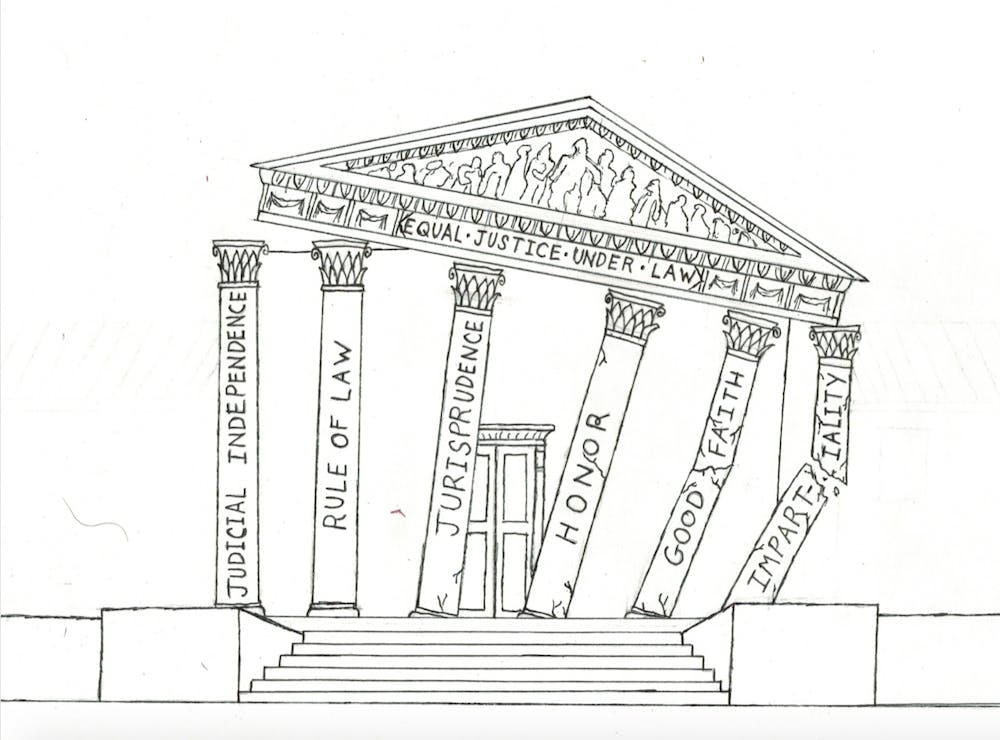Justice Ruth Bader Ginsburg’s passing and the ensuing scramble for her replacement have exposed a fundamental flaw in how America designates its judiciary. The partisan process of nominations and confirmations — procedures spearheaded by politicians with competing interests — has become contrary to the ideal of a nonpartisan court. To preserve the integrity of the judiciary, we must divorce appointments from political deliberation and put the people who know best in charge: the Justices themselves.
Depoliticizing the appointment process is the only way to prevent the further erosion of judicial independence, which is crucial for the preservation of the Court’s integrity.
Judicial independence is a relatively new concept in the long history of the common law, but it is a fundamental element in countries under its jurisdiction. First appearing in the Act of Settlement of 1701, which lay down new rules to determine the succession of the English monarch, among other provisions, the Act stipulated that judges were to serve as long as they maintained “good behavior” and could only be removed from the bench by joint action of both Houses of Parliament.
This was designed to decrease the influence of the monarch over judges, a phenomenon that dated back to medieval times when the courts were intrinsically under the control of the king, as their role was to administer justice in his realm according to his principles. Despite this separation from royal influence, judges were still appointed by the monarch under the advice of his ministers.
The writers of the U.S. Constitution went further in this regard, requiring the Senate to confirm a Supreme Court nomination by the President, further separating Justices from executive power.
This seemingly ingenious solution, however, has made way for another type of threat to judicial independence — that of perceived partisanship. Putting judicial appointments in the hands of politicians who often seek to undermine opposing agendas has made these judges another set of pawns in the game of politics.
To advance their goals, politicians will portray their candidates as either “conservative” or “liberal” in ideology. In turn, these same judges are forced to lean into this narrative if they hope to advance in their careers. This perception of partisanship on the bench directly undermines the legitimacy of the opinions of Justices, who are increasingly perceived to come from a point of ideology and not from the law itself.
The ancient common law maxim reads judex est lex loquens — “the judge is the law speaking.” If judgments are not perceived to come from the law — especially those with the sweeping power of judicial review — their standing and legitimacy will be under question, endangering the soundness of the rule of law.

This issue does not lie with the judges themselves, but with a system that encourages political play through judicial appointments. While no single political monolith is in charge of appointments, splitting the responsibility is no better, as it creates situations of great controversy that divide the nation and challenge the rule of law as a partisan issue.
The solution to this could involve removing the ability to nominate candidates from politicians and putting it in the hands of an apolitical selection body. This type of reform has been implemented in various nations, most notably in the United Kingdom, the cradle of the common law itself and the direct predecessor of the American legal system.
Since 2006, the selection of judges and justices of their Supreme Court has been in the hands of a committee composed of lawyers and judges of different jurisdictions, who comb through nominations and applications and select one candidate. While requiring significant constitutional reform, this system could take hold in the United States, finally putting an end to the cruel political tokenization of hearings such as the ones conducted on the likes of Amy Coney Barrett and Merrick Garland.
Many of my peers at Princeton and other institutions might scoff at the idea of this kind of constitutional reform. They desire rapid and immediate change, so why not just do something else to fight back? Like retaliating for the Merrick Garland fiasco with a similar measure, for example. Or even better, by packing the Court, but in our favor.

To this, I respond that by engaging in this behavior, you further feed into the notion that the Court is a partisan, political institution responsible for change and innovation of the law, which is fundamentally incorrect. The job of the court is to interpret the law, and despite its ability to strike it down, it should only be used as a rectifying tool, not as an extralegal innovator.
Engaging in retaliatory political bickering or court packing further undermines the integrity of the system. Even if it brings some good in the short term, it will forever set a precedent that will allow politicians to use the Court like any another political tool, defiling a sacred pillar of our democracy that must stand even through the strongest winds of partisanship.
Slow — but legitimate — reform through the legislative branch is the only type of change that will work and persist. That can only be achieved if young students like us — as voters — have this clear long-term goal in mind when performing our civic duty.
As Princetonians, many of us will have the opportunity to contribute to that reform through means more direct than simple participation in suffrage. I am sure many of my peers will serve in legislatures, whether local, state, or national. Many more will join or create political advocacy groups and participate in activism aimed at developing a fairer, stronger judiciary. While short term victories, like appointing more “liberal” or “conservative” Justices may seem the most appealing, please consider the integrity of these courts as timeless institutions. More effort and activism should be centered on returning independence and impartiality to the courts, not pushing individual political agendas, no matter how powerful the courts might be as tools.
Nevertheless, reforming the appointments process of the Supreme Court is but the tip of the iceberg. Almost all judicial positions in America involve some sort of process that lends itself to partisan politics. Federal judges go through a similar process as Supreme Court Justices, and many local trial and state-level judges are elected in partisan contests, to name a few examples.
While America is built on a notion of democratic consent and accountability, in a world where politics are increasingly polarized, this type of political influence can be a disservice to the integrity of the Judiciary’s mission. A model that minimizes the meddling of politicians is our best bet at preserving the integrity of the law.
Juan José López Haddad is a junior in the School of Public and International Affairs from Caracas, Venezuela. He can be reached at jhaddad@princeton.edu.








